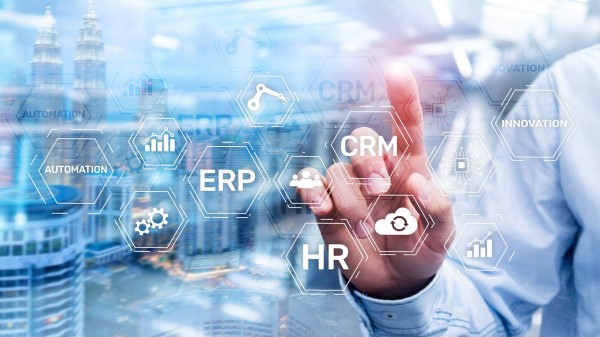Selecting the right Enterprise Resource Planning (ERP) system is a critical decision that can significantly impact the success of your business. An ERP system acts as the backbone of your organisation, streamlining operations, integrating data, and empowering data-driven decision-making. With a plethora of options available in the market, finding the perfect ERP fit can be daunting. In this blog, we will look at seven essential factors to consider when searching for the right ERP system to ensure you make an informed choice that aligns with your business needs and objectives.

1. Comprehensive Functionality
A robust ERP system should encompass a wide range of functionalities, including finance, sales, inventory management, procurement, and more. Assess your organisation’s specific requirements and look for an ERP that addresses those needs comprehensively.
Business Central is one such comprehensive ERP system. Whether you’re a small business or a large enterprise, Business Central has all the functionality you need to transform the way you manage your operations, enhance productivity, and unlock new opportunities for success.
2. Scalability and Flexibility
Make sure you choose an ERP system that can grow with your business. Scalability is crucial, as it ensures the ERP can handle increased data volumes, additional users, and new functionality as your organisation expands. A flexible ERP allows for customisation and integrations with other essential software applications to meet your unique business demands.
Business Central is designed with scalability at its core. With a monthly subscription fee, you can easily add users as needed. It has extensive functionality that grows with you as your business grows. You can add multi-company or multi-currency options too, and creating consolidated companies is very straightforward.
3. User-friendly Interface
An intuitive and user-friendly interface is essential when selecting the right ERP and ensuring its successful adoption across your business. Look for an ERP system with a clean and organised interface that minimises the learning curve for employees. A system that is easy to navigate will enhance user productivity and reduce the time spent on training.
Business Central has a modern, user-friendly interface. Users have the ability to move easily around the system, drill down into the detail of individual transactions, accounts, reports and graphs with the click of the button. It is also possible to personalise the user experience through its easy-to-use Role Centre functionality.
4. Integration Capabilities
An ERP should seamlessly integrate with other critical business systems, such as Customer Relationship Management (CRM), e-commerce platforms, and third-party applications. Integration capabilities facilitate a cohesive flow of data across the organisation, eliminating data silos and improving overall efficiency.
Business Central offers seamless integration with both the Microsoft stack and a range of third-party applications including CRM, inventory management systems and e-commerce platforms. Business Central comes with an extensive list of built-in APIs that require no code and minimal set up to use. These built-in APIs will allow you to easily integrate your Business Central system with your third-party solutions and services.
5. Reporting and Analytics
In today’s data-driven world, an ERP’s reporting and analytics capabilities are crucial. When selecting the right ERP for your business, make sure you choose a system that offers robust reporting tools and real-time analytics to generate actionable insights for data-driven decision-making. Look for an ERP that provides customisable dashboards and supports data visualisation.
Business Central has a range of built-in reporting facilities, standard reports, financial reports and on-screen reporting capabilities. In addition, extra reporting and analysis can be added via Power BI which has native integration with Business Central as well as leading third-party reporting applications such as Jet Reports.
6. Mobile Access
In a fast-paced business environment, mobile access to ERP data is becoming increasingly vital. When selecting your ERP, ensure that the system you choose offers mobile compatibility, allowing key stakeholders to access critical information on the go, fostering remote work capabilities and better decision-making.
Moving to a native cloud-based ERP such as Business Central will allow your employees to perform both back-end and front-end tasks from anywhere and at any time. Also, up to date business data can be accessed on the go which means that important business decisions can be made without any unnecessary delays.
7. Supplier Reputation and Support
Selecting a reputable ERP partner with a track record of successful implementations and customer satisfaction is crucial. Evaluate the partner’s support services, including implementation assistance, training, and ongoing customer support. A reliable partner will be a valuable collaborator throughout your ERP journey.
How TVision Can Help You
If reading this article has made you realise that you have outgrown your current ERP and you feel you need a more robust and modern business management solution, TVision Technology can help you make the next step when selecting the right ERP for your business.
We are the largest and most experienced providers of Business Central in the UK. Our team take real pleasure in working with our clients to develop, implement and support the best possible ERP implementation for their needs, and it’s this enthusiasm for our work which sees us keep our relationships with clients long after the initial implementation is complete.
If you want to know more about Microsoft Business Central and how TVision could help you, please feel free to contact us to arrange a demo to see how moving to Business Central could be the right business move for you.

